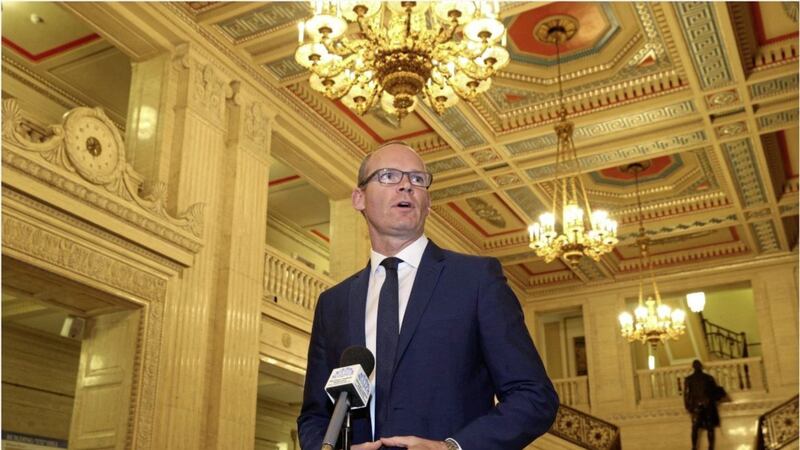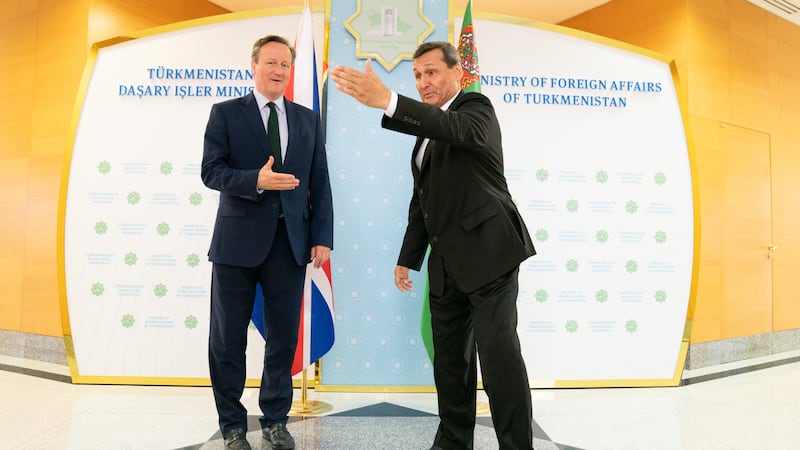The British government has said there can be no joint authority over the north following yesterday's comments from the Republic's foreign affairs minister Simon Coveney that direct rule from London could not be imposed without input from the Irish government.
Dublin has a legal obligation to be consulted on issues involving North/South co-operation under the Good Friday Agreement.
The British government statement said: "We will never countenance any arrangement, such as joint authority, inconsistent with the principle of consent in the agreement."
The agreement gives prominence to a "principle of consent", which affirms the legitimacy of the aspiration to a united Ireland while recognising the current wish of the majority in Northern Ireland to remain part of the United Kingdom.
Secretary of State James Brokenshire has warned he may pass legislation at Westminster to fund public services if no political agreement can be found.
Senior Sinn Féin representative Alex Maskey suggested the UK's intervention represented a "slapdown" for the Irish government's position.
The two administrations have been meeting Stormont parties as they consider whether to kick start fresh talks aimed at restoring powersharing.
Ministers have not sat at Stormont for seven months after the late Martin McGuinness resigned as deputy first minister in a row over the DUP's handling of the Renewable Heat Incentive scheme.
Since then a dispute over a proposal to introduce in an Irish language act has been among the issues dividing the parties.
The British government statement added: "The UK Government, along with the Irish government, is engaging intensively with the Northern Ireland parties to secure the re-establishment of inclusive, devolved government at Stormont, and the operation of all the institutions established under the Belfast Agreement.
"That is our clear objective and we are determined to succeed.
"Should this not prove possible, in the absence of devolved government, it is ultimately for the United Kingdom Government to provide the certainty over delivery of public services and good governance in Northern Ireland, as part of the United Kingdom. This is consistent with our obligations under the Belfast Agreement."
Mr Brokenshire has warned he may have to legislate for a Stormont budget to fund the under-pressure health service and other public responsibilities if the deadlock continues.
Mr Coveney said there were still grounds for optimism and direct rule should still be avoided.
"There can be no British-only direct rule. That is the Irish government's position.
"It would be very difficult to even contemplate how direct rule would function in that context.
"We don't want to go there, it is not good for Northern Ireland, it is not good from the point of view of the government that I am a part of, it is not good from the point of view of the Government in London, everybody loses in that scenario."
The Fine Gael minister was speaking after discussions with Stormont's main parties yesterday amid renewed efforts to reboot the executive.
The meetings follow similar talks between the parties and Secretary of State James Brokenshire on Monday.
Last week, Sinn Féin claimed there was nothing new about a DUP proposal to put executive ministers in place straight away, while discussing culture and language legislation in a specified timeframe.
Mr Coveney outlined how growing financial pressures and a "relatively narrow window" meant the talks process could not drag on indefinitely.
He said there were a number of "positives" coming out of yesterday's discussions and warned that the north was seriously disadvantaged without an executive in place.
The minister said all the parties had signalled that they wanted a return to devolved government.
"They want to be part of that but clearly there are issues that were there in June and July – some of which are still there – that need to be resolved before there is a trust in place that will allow the executive to be set up again," he said.
However, he noted how legislation to put a fresh executive in place was required "sooner or later" and that the parties needed to work together in future as well as to get devolution restored.
"But there will be political leadership needed to actually look towards compromise, as opposed to holding on to hardline positions on key issues where there is a difference of opinion," he said.
Mr Coveney said there was cause for optimism and "time and space" to create a different political atmosphere after "two very difficult elections".
"Let's be straight, we need to find agreement between Sinn Féin and the DUP on core issues and we need to find a way of doing that allows the leadership of both parties to be able to sell that to their support base in order for that to progress," he said.
He said Mrs Foster's speech last week was a "step in the right direction" and that there were "positives" in Gerry Adams's speech yesterday in Co Meath.
"We need to build on those positives and put a mechanism in place that can allow that to turn into a relationship that can allow a deal to be done," he said.








